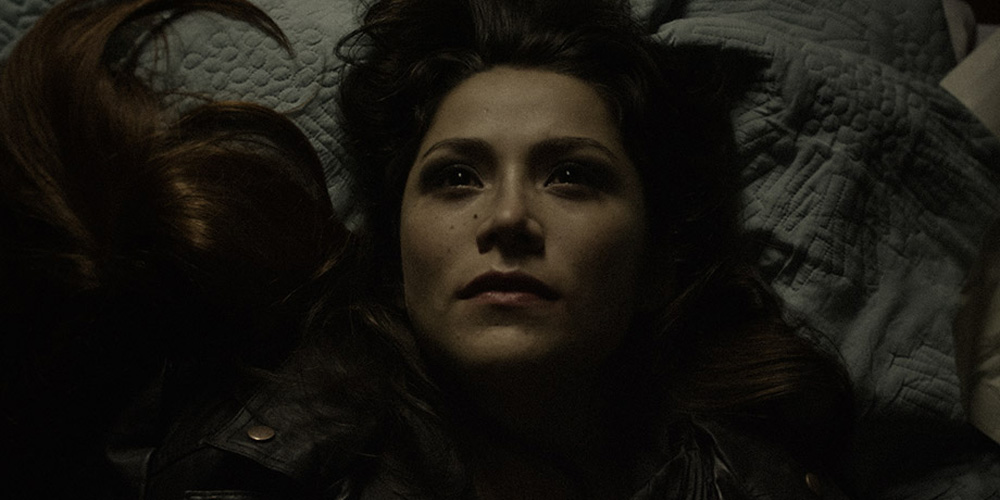In case the title of her debut film “I Am Not Lorena” didn’t make it clear, Isidora Marras would like the world to know she has never gone by that name. Yet after being plagued for months with calls from various debt collectors and acquaintances of someone named Lorena Ruiz, the Chilean filmmaker saw an opportunity in the cell phone mix-up to make audiences feel the same level of anxiety as she did in a thriller about a young woman who isn’t only mistaken for someone in serious trouble but can hardly find a remedy in a computerized world where identity can either become so fixed or lost so easily.
While Marras didn’t even change the name of the person she was being misidentified as when she transferred this problem to her lead character Olivia (Loreto Aravena), she only used her own experience as a springboard to a larger meditation on identity, told under the guise of a potboiler. With a mother (“Gloria” star Paulina García) slowly succumbing to Alzheimer’s and a neighbor dressed in drag (Maho Farías), Olivia’s life becomes filled with people in the midst of great existential change in front of her very own eyes, not to mention her own professional calling as an actress. The result is an increasingly surreal thriller, directed with great lucidity by Marras in her first feature effort as a writer/director, that makes the cultural implications of Olivia’s situation as profound as the personal ones that nearly drive her to madness.
Shortly before the film premieres at the Toronto Film Festival, Marras spoke about how she turned an annoying experience into something professionally gratifying, putting the audience in Olivia’s increasingly fractured mind and shooting during live protests in Chile.

I started with the feeling that I should do a documentary and when I started investigating subjects, I received a very mysterious call from a woman calling Lorena Ruiz. I told her I’m not Lorena Ruiz, but she start saying, “No, you’re a liar! I was with you yesterday, so how can you not be Lorena Ruiz?” I said, “Oh fuck! This can be a thriller.” Then I started writing it as fiction with a friend who is a screenwriter.
Both the opening and closing scenes of the film involve characters looking at their reflection and throughout the film, there are a lot of mirrors. How did that become a visual motif in the film?
I usually love riding the subway in Santiago and I was impressed by the fact that people always sit with their cellphones and they don’t look at the people sitting next to them, so one day, I was in the subway, looking at all these people watching their cellphones and I see myself in the door. I thought, “It’s interesting nobody is present right now. Everybody is psychologically in another place.” That’s why I had that [visual motif] in mind and I said, “Well, this is an identity thriller, so how can I work with people’s identities,” which [led me to] using all the mirrors and all the reflections in different places.
One of my favorite scenes in the film is actually when Olivia goes to a customer service for help and they refer her to a computer kiosk, even though they’re not busy.
I love that scene too and I have to confess that scene happened to me when I went to talk to one of the staff [of a company] that was calling me. I went to speak with someone in the client service and they told me to speak to a woman in another place that was on the screen. It’s something so casual [because of] technology, but it was just as it happened. Technology is present always. It’s really crazy. Because they have your cell number, they can call you every day or on weekends and sometimes it’s not even people call you, then they use these weird instruments as this [touch] screen with someone in a call center that is speaking to you while there isn’t anyone else to help you. I didn’t have to invent much for those scenes.
Almost all the main characters in the film are actually experiencing a shift in their identity when we meet them – the mother is struggling with her memory and Olivia’s next door neighbor is a transsexual. Did writing these characters actually inform one another?
When we created those characters, we were always thinking about the identity issue. I wanted the mother to have Alzheimer’s from the beginning because it was very important to me that Olivia started to disappear for the people who were near her. I had a grandmother that had Alzheimer’s and my father always told me how it was very difficult for him to see how his mother was disappearing, but in fact, he was disappearing for his mother and not the other way [around]. Then Rosetta, the neighbor, is the only character that’s really okay with her identity. For all the others, it’s a problem.
You actually have extensive experience as an editor. Did that help you as a director?
Yes, in fact, I still work as an editor and it was really important to have the time to think about the editing of the movie. I worked a lot with Catalina Marina, the main editor, to find the best structure [for the film] and we wanted you to be in Olivia’s mind — you need to see that not only in Loreto’s performance, but also in the language of the movie.
I’ve read you incorporated some things into the film on the fly since the shooting schedule was so tight and you’re able to shoot at a protest rally with hundreds of people that Olivia runs through. Was that something that was planned?
Yes and no. The protest, in fact, it was the first thing we filmed in the movie because it was happening and it wasn’t in the script, but I thought it was a good way to show the context of Olivia is surrounded by a society that’s not comfortable with a lot of things that are happening. She’s not part of the protest, but protests are happening and in Chile, and protests weren’t that common 15 years ago. It’s good way to show that she belongs to a society that has a lot of problems that are very similar to the phone calls that she receives.
You’ve directed some shorts before this. Was directing a feature any different?
Yes, of course. I have done three short films and two of them are documentaries, but it’s really different working with actors, working with the sets. It’s difficult, but it’s a great experience that only makes you grow.

It was a great honor and pleasure because when I did the film with Paulina, she just finished “Gloria,” and it hadn’t come out yet, so she wasn’t very famous nationally. But she was a theater actress that I always admired and because Paulina is an acting teacher, directing a teacher was very difficult for me, but it was great, great experience.
How did you get interested in moviemaking?
I always loved moviemaking and I studied audio/visual direction [in school], but I never thought that I would be a filmmaker. It was really accidental, but I love telling stories and it’s a natural process for me, so it was the best accident in my life.
“I Am Not Lorena” does not yet have U.S. distribution. It will play the Toronto Film Festival on Sept. 5 at the Scotiabank 9 at 6:30 pm, Sept. 7 at the Scotiabank 8 at 5 pm and Sept. 13 at the Scotiabank 4 at 12:45 pm.




